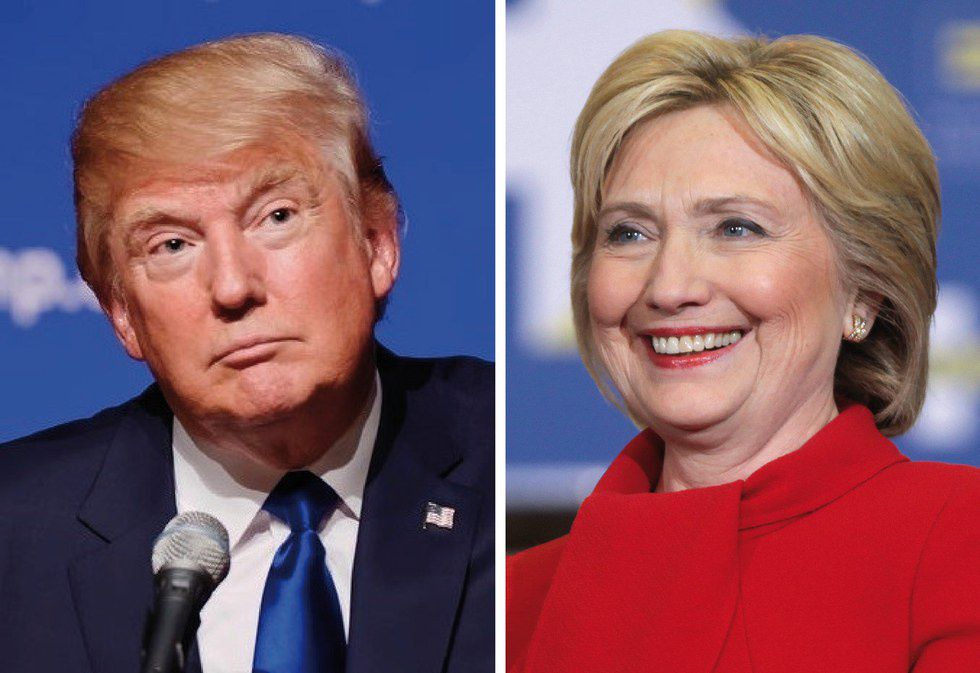As an international student, I cannot vote. So, why am I here? To amuse myself? To feel engaged in my immediate community? To become another performer in the big and chaotic political drama? But it is exactly at this moment of disbelief that I realize Trump was wrong.
Hillary had quite an amazing performance, especially during the first and last 30 minutes of the debate. Confronting Trump's explosion, she still triumphed with her calm composure, victorious smile and cutting retorts. My favorite moment was when she said: "You criticize me for preparing for this debate. And yes, I did." I like thinking about how this sentence can be interpreted differently by different groups. For Hillary's supporters, it is an especially powerful statement. However, from the perspective of Trump's supporters, Hillary's preparedness may actually support Trump's strategy.
Indeed, the two repetitive arguments Trump made during the debate were: first, America is being ripped off, and second, politicians are good at making promises but terrible in fulfilling them. Compared to Hillary, Trump is clearly inferior in political knowledge and skills, but it is exactly this "political naivety" that appeals to the people who have got tired of the political elitism in America. From their perspective, today's debate may only be another confirmation of Trump's message.
It is interesting to see how personal attacks were employed in the debate. Hillary succeeded in associating her plan to focus on the middle class with her family background and in linking the people mistreated by Trump with her father. At the same time, Trump also successfully blamed Hillary for hypocrisy by exposing her previous disrespect for Obama. Though the candidates proposed quite different agendas, much of the debate revolved around the questions of the candidates' sincerity and efficiency — which actually aligned with Trump's intention. Even in this aspect, however, Hillary's performance was commendable. Her admitting responsibility in the private email blunder was one of her most powerful moments.
Finally, it is worth remembering the target audience of their approaches: Hillary tends to attract more voters, while Trump aims to reinforce the loyalty of his supporters. Both the candidates' exhibitions, therefore, were consistent with their images and strategies. For Hillary's supporters, her performance, sterling as it was, should not be the reason to be over-optimistic, as it could be interpreted very differently by Trump's supporters.
I left a few minutes before the end of the debate, shown in a huge lecture room at Earlham, finding in the lobby some people who also already had enough of political rhetorics. Before the debate commenced, we were all both excited and nervous. At that moment, when the excitement had passed, our concern didn't seem any better resolved. Somehow, I witnessed in myself a strange feeling — the blankness that often emerged after parties. The sound of clapping and laughter emitted from the room I left just a minute ago was no longer relatable. For a moment, I agreed with Trump and wondered why politicians had to make such an exhibition of themselves, and why we were here, watching nervously and discussing fervently as if our individual opinions mattered a lot.
It's frustrating to think that whether you consider this presidential debate an entertaining show or a serious affair, your vote still counts as one and only one. As an international student, I cannot vote. So, why am I here? To amuse myself? To feel engaged in my immediate community? To become another performer in the big and chaotic political drama? But it is exactly at this moment of disbelief that I realize Trump was wrong. He was wrong in conjecturing the saturnine picture of America and categorically blaming politics for it. As frustrating and chaotic politics in a democracy is, it is still the most viable solution to engaging the whole society in solving shared issues and conflicts.
I have always been impressed by the extent to which American people feel connected to the macro-context and the way political debates get into their daily conversations. This political and social awareness is sustained by events like this presidential election, when, more than ever, we become aware of our vulnerability to the uncontrollable macro-context and at the same time, our power in shaping lives according to our independent will. This twofold acknowledgment of the individual's role in the community will continue motivating our engagement in our more proximate political contexts.
For the political dilemma we now face, let's see whom history will favor.












































